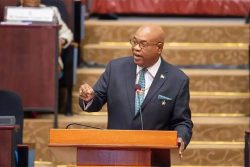Dear Editor,
I believe that the People’s Progressive Party (PPP), as a party and as the PPP/Civic government, is sincere in its desire to forge genuine links and work with the African Guyanese sector of the society.
This sincerity, in my opinion, springs principally from the PPP’s realization that it needs to destroy the myth that its governance of Guyana is deliberately configured to serve only the interest of Indian Guyanese.
This is why the PPP is boldly venturing to initiate programmes aimed at producing an economic uplift in traditional and exclusive opposition enclaves.
These initiatives are being met with mixed responses. Residents in these areas who are focused on ‘livism,’ the bread and butter issues that daily and directly affect their struggle to survive, welcome the PPP’s outstretched hand with cautious optimism. But faced with the realities of daily life in Guyana and the need to have a steady income, they soon override their trepidation and become gainfully involved in whatever government initiative or programme is in operation in their area. Some local leadership personalities welcome these PPP interventions, see them as opportunities to be fully exploited for personal benefit, and have proceeded to so exploit them.
But these PPP initiatives, aimed specifically at forging mutually beneficial unity between traditional racial groups, are not welcomed by those whose political and personal fortunes rest heavily on the foundation of ethnic divisiveness. The success of government-community programmes in which African Guyanese are predominantly and fully involved will nail the lie that the PPP/Civic government is administering the affairs of the nation in the exclusive interest of Indian Guyanese. It will also signal to African Guyanese who have doubts about the motivations and intentions of the PPP/Civic government that they have noth ing to fear from this government; that the government is genuinely concerned about their welfare; and that it is intent on taking practical and tangible steps to ensure their economic wellbeing. Ultimately, this type of government intervention will lead to the development of a new harmonious working relationship and a deepening of trust between the government and the African Guyanese community.
Some leaders in African Guyanese communities do not welcome this development. Any co-operation and harmony between the government – falsely and conveniently branded as pro-Indian Guyanese – and African Guyanese at the community grass-roots level is opposed by some diehard opposition persons. They want to continue keeping the nation divided along racial lines, for it is this division and their crafty exploitation of it that gives them some sort of dubious relevance in their communities. Thus it is that they have set to work energetically trying to undermine government community initiatives. They want to ‘prove’ that the government is making only ineffective and cosmetic development efforts in areas predominantly African Guyanese. Their main goal, however, is to discourage all African Guyanese from daring to realize that much can be gained from working co-operatively and harmoniously with the present Guyana government.
My questions to the purveyors and practitioners of racial division in Guyana are: What have they got to show for all the years they promoted ethnic divisiveness? What tangible progress have they made for the development of their community?
Yours faithfully,
Jamal Ali








